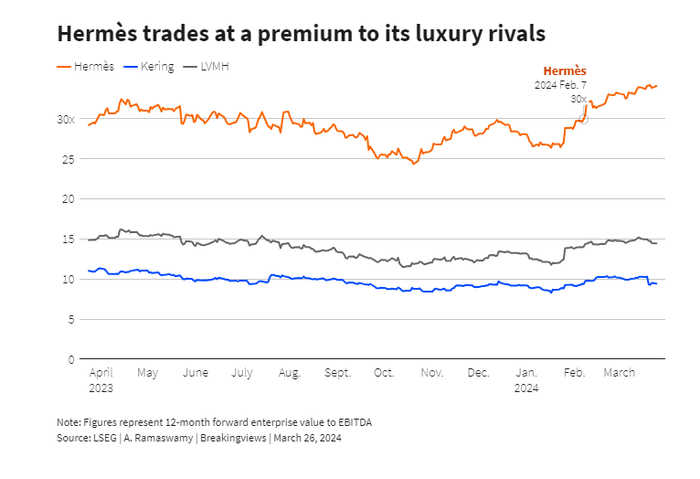Published 11:07 IST, April 1st 2024
Hermès lawsuit attacks luxury’s FOMO premium
Hermès’ must-have aura is burnished by its lofty clientele,Birkin bags sell for at least $10,000 each.
- Republic Business
- 3 min read

Over-accessorizing. The $274 billion luxury house Hermès International might be a little too exclusive. In a lawsuit filed last week, two California shoppers allege that the brand violates U.S. antitrust law by forcing customers for its much-sought Birkin handbags to first buy other items. If successful, the case could crimp Hermès’ fastest-growing segments and ultra-luxe goods’ mystique.
Hermès’ must-have aura is burnished by its lofty clientele: Birkin bags sell for at least $10,000 each. The lawsuit alleges that getting to the front of the queue for the carrier is grueling. One plaintiff claims they had to buy tens of thousands of dollars’ worth of home goods and scarves just to have a chance at being shown a Birkin. In legal parlance, this is “tying,” or forcing customers seeking one good in which a company is dominant to purchase other goods facing more competition. The U.S. government sued tech stalwart Microsoft in 1998 over philosophically similar claims.
Plaintiffs here will likely have to show that Hermès consistently enforces a policy of requiring unrelated purchases as a pre-condition to buying its top-tier bags, and that this practice restricted competition for accessories. To the first point, the lawsuit claims that Hermès sales associates don’t earn commissions on selling Birkins, while they take a 3% cut on other goods, potentially indicating perverse incentives.
But the accessory market is highly fragmented, and in-store snobbery isn’t new. Customers of Chanel, for instance, have said that they receive more favorable treatment for buying clothing in addition to the brand’s handbags, according to the Washington Post. Plus, a strong secondary market offers alternative access to the bags.
Still, if plaintiffs clear their hurdle, it could pose a real risk to high-flying Hermès. Those secondary sales are often at a premium to Birkins’ original purchase price, bolstering their appeal. Anything endangering the current sales model could wreck that delicate balance. And if Birkins’ aura really drives sales of other goods, Hermès’ highest-growth areas could suffer. The company’s leather goods segment, which includes Birkin, grew revenue 12% in 2023, while ready-to-wear clothing, watches and jewelry, and home goods expanded much faster.
That growth aids a valuation as premium as the company’s bags, with shares trading at 33 times expected earnings – over double the multiples of rivals LVMH and Kering, according to LSEG. An adverse court outcome would put any similarly exclusive retailers on notice. The resurgence of antitrust enforcement has hit everything from tech to groceries; the rarefied air of ultra-luxury fashion may not be immune.

Updated 11:07 IST, April 1st 2024